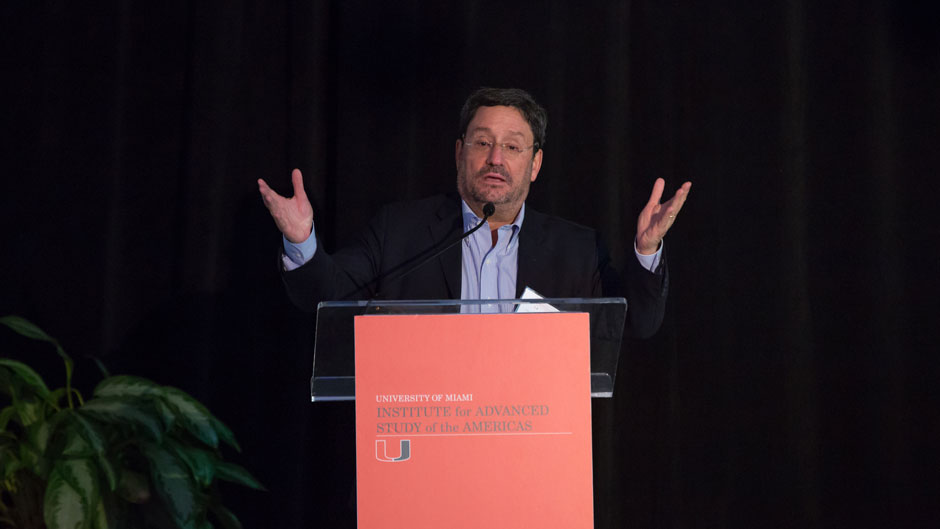At a time in which Colombia enjoys an image as one of the most stable countries in the region, with a decrease in crime, narco traffic, and a growing tourism industry, the South American country and its new president, Ivan Duque, is also facing some of the most daunting challenges.
Among those challenges: The Venezuelan economic and political crisis has resulted in more 1 million refugees in the last year fleeing into the country, said Francisco Santos, ambassador of Colombia to the United States, who spoke at the University of Miami Institute for Advanced Study of the Americas (U-MIA) on Wednesday before a group of academics, students, and community members.
“The crisis in Venezuela …is already creating a huge strain in the region and will present the biggest challenge in the region for the next five years and beyond,” he said. “The challenge to our health system, education and to the labor situation is gigantic and we foresee that growing.”
He added that Colombia would not stop the flow of refugees “because we know what they are escaping.” He also warned that the entire Latin American region was undergoing deep political shifts.
“Latin America is in flux where democracy has become a swinging pendulum and that is confronting some serious challenges in the future,“ Santos said, making references to the recent election in Brazil of Jair Bolsonaro, a right wing populist who was elected President in late October and to the election of leftist Andres Lopez Obrador in Mexico.
UM President Julio Frenk spoke at the beginning of the event and welcomed Santos saying, “there is no better place than the University of Miami to hold this conversation. It is a function of an exemplary institution to serve and offer a space where multiple perspectives on topics of great importance can be debated.”
Felicia Knaul, director of U-MIA, also warmly welcomed the ambassador.
“We are thrilled to be able to host the ambassador to the Institute,” she said. ”We have a very strong connection to Colombia at this University. We now have 13 full faculty members who specialize in the study of Colombia and 60 undergraduate students.”
Santos, a former journalist and government official who was kidnapped and then released in 1991 by drug lord Pablo Escobar’s cartel, was asked by Bruce Bagley, professor in UM’s Department of International Studies, what was the future of the Peace Accord with the FARC rebels. In 2016, former Colombian President Juan Manuel Santos signed an agreement with the rebel group to end a five decades conflict.
Duque, a former senator, vowed to fight corruption and change the peace deal with the FARC rebel group. Santos said that the government would abide with parts of the agreement, including coming up with $500 million for the coca planters to transform their fields to other crops and continue to reintegrate young FARC rebels into mainstream society. The government will eliminate certain lenient concessions to the drug traffickers, he said
Santos admitted that Colombia is facing one of its largest challenges in combating the growing cocaine trade in certain parts of the countryside where the Mexican cartels have created an organized industry.
“Coca is no longer the product of the small peasant that has nothing to eat,” he said. “There is evidence that many of the Colombians are just hired hands of the Sinaloa cartel.”
Another worry for the Duque administration is a burgeoning rise of dissident rebels, many living near the Venezuelan border or on the other side of the border causing increasing violence in different areas of the country, he said.
Santos vowed that the government plans to combat drug traffic at every stage. But he returned to the Venezuelan crisis as one of the main problems the region faces. “Venezuela is really a rogue state,” he said. “We never had that in Latin America but we do now.”
He said the United States was the country with the ability to apply the most pressure to Venezuela since it sells much needed gasoline to the country. He anticipates that the U.S. will be much more forceful against Venezuela in the coming months.

